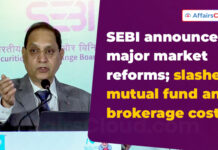 The government has allowed the Employees Provident Fund Organisation (EPFO) to invest proceeds from the sale or redemption of investments in equities and related assets.A new clause was added on August 24, 2023, to amend below previous two notifications.
The government has allowed the Employees Provident Fund Organisation (EPFO) to invest proceeds from the sale or redemption of investments in equities and related assets.A new clause was added on August 24, 2023, to amend below previous two notifications.
Background Notifications
i.April 23, 2015 Notification: Discusses investment of incremental accretions by EPFO.
ii.May 29, 2015 Notification: Defines instruments and limits for EPFO investments.
Insertions in Notification (dated September 1, 2023)
i.Added “sale or redemption of investment in equities and related investments” to the list of allowed actions.
ii.EPFO can invest a minimum of 5% and a maximum of 15% in equities and related instruments.
What is EPFO operation?
- EPFO is an organization under Ministry of Labour & Employment, Government of India that manages provident funds, which are retirement savings accounts for employees in India. It collects contributions from both employees and employers and invests these funds in various places.
- The aim is to generate returns on these investments, and part of these earnings is then distributed to the account holders as interest on their provident fund accounts.
Guidelines for Equities and Related Investments
i.Stock Investments
- EPFO can invest in shares of companies listed on Bombay Stock Exchange (BSE) or National Stock Exchange (NSE) with a market capitalization of ₹5000 crore or more.
- Investment can also be made in mutual funds with a minimum of 65% of their investments in BSE or NSE listed equity.
ii.Exchange-Traded Funds (ETFs)/Index Funds
- EPFO can invest in ETFs/Index Funds replicating the BSE Sensex Index or the NSE Nifty 50 Index.
- ETFs issued by Securities and Exchange Board of India (SEBI)-regulated mutual funds for disinvestment of the Government of India’s shareholding in body corporates can also be used.
- Use exchange-traded derivatives for hedging, limited to 5% of total equity and equity-related investments.
Current mandated existing investment pattern of EPF
| Instrument | Current Investment Plan (Since April 1, 2015) |
|---|---|
| Government securities | Min: 45% and up to 50% |
| Debt securities and term deposits of banks | Min: 35% and up to 50% |
| Short-term Debt Instruments and Related Investments | Up to 5% |
| Equity and equity related Instruments | Min: 5% and up to 15% |
| ETFs/Index funds | Part of limits set for equity and equity-related Instruments |
| Asset backed securities, units of real estate/ infrastructure investment trusts | Up to 5% |
EPFO’s Investment Approach
i.EPFO does not directly invest in individual stocks, including blue-chip companies.
ii.EPFO invests in equity markets through ETFs replicating BSE-SENSEX and NIFTY-50 indices.
iii. EPFO also invests in ETFs designed for the disinvestment of the Government of India’s shareholding in body corporates.
EPFO’s Investment Portfolio (as of December 31, 2022)
i.Total corpus of various funds: Rs. 18.30 lakh crore.
- Over 91% of investments in Debt instruments.
- Remaining investments in ETFs: As of January 31, it had invested 10% of its proceeds in ETFs, with the aim of achieving the maximum permissible threshold of 15%.
ii.EPFO has invested over ₹2.01 lakh crore in ETFs since 2018-19 until July 2023.
iii. EPFO’s equity investments are exclusively through ETFs, totaling more than ₹2 lakh crore as of July 31.
- EPFO was allowed to invest in equity-related investments in 2015 for the first time.
iv.EPFO serves over 6.5 crore subscribers.
Important investment terminology
ETF (Exchange-Traded Fund): An investment fund that holds a collection of assets, such as stocks, bonds, or commodities, and is traded on stock exchanges, similar to a stock.
- ETF share prices change throughout the trading day similar to how stock prices change constantly; this is different from mutual funds, In contrast, mutual funds are priced once daily, typically after the market closes.
Blue Chip Company: A well-established, financially sound, and reputable company with a history of stable growth and reliable performance, often considered a safe investment.
Index Fund: An index fund is a passive investment vehicle that mirrors the performance of a market index like the S&P 500. It provides diversified exposure to either a particular sector or the entire market.
Hedge Fund: An investment fund that uses various strategies to generate returns for its investors, often with higher risk and fees compared to traditional funds.
Recent Related News
The Employees Provident Fund Organisation (EPFO) has formed 3 committees to frame draft schemes for pension, provident fund and insurance under EPFO, in line with the provisions of the Code on Social Security 2020.
The three schemes are:
- Employee’s Provident Fund Scheme (EPFS) for provident fund
- Employee’s Pension Scheme (EPS) for pension
- Employees Deposit Linked Insurance Scheme (EDLIS) for insurance
About EPFO:
Central Provident Fund Commissioner(CPFO)/CEO – Ms. Neelam Shami Rao
Headquarters – New Delhi
Establishment –1952




